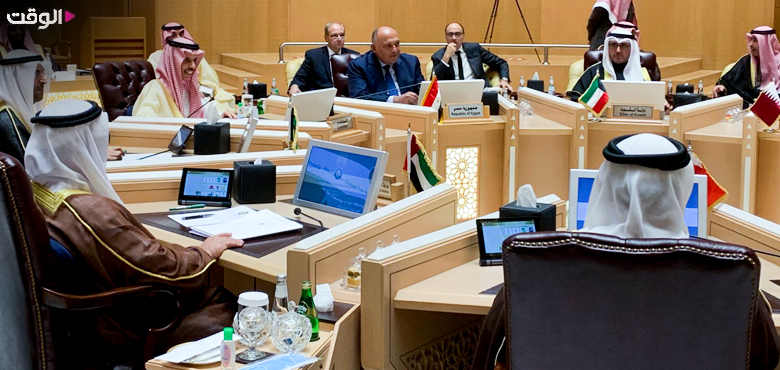Alwaght- Egypt's Foreign Minister Sameh Shoukry visited Saudi Arabia on December 12 with an aim to initiate a new political mechanism between Cairo and (Persian) Gulf Cooperation Council. According to the Egyptian foreign ministry, foreign ministers of the six Persian Gulf Arab states along with Nayef al-Hajraf, the secretary-general of the (P) GCC, would advance the motion for the new mechanism.
Although in appearance this mechanism seeks to create a suitable milieu for Cairo's bilateral cooperation with Saudi Arabia, UAE, Kuwait, Bahrain, Qatar, and Oman as members of the Cooperation Council, examining the possible dimensions and implications of this effort, we can discover a broader issue in the political equations and balance of power in West Asia and North Africa regions.
Egypt led the Arab world in the post-1960s as a result of the pan-Arab policies of Gamal Abdel Nasser, a role that was greatly weakened during the time of his successors, including Anwar Sadat and Hosni Mubarak. Although Cairo lost its leadership in the Arab world due to the compromises and betrayals of the post-Nasser leaders, the Egyptian intellectual and civil society has been undoubtedly able to continue to lead the Arab world culturally through its thinkers and intellectuals. In the present conditions, Cairo's efforts to establish a special mechanism for cooperation with the member states of the (P) GCC should be viewed as the result of special reasons, which include a set of internal, regional and international variables. In examining these reasons, it is extraordinarily significant to take into account Egypt's potentials to occupy such a position and role.
What are Egyptian potentials and reasons for a role in the Persian Gulf?
US exit vacuum and Washington encouragement of Egypt to revive Arab army project: In recent years, the US sent signals of departure from putting West Asia at the center of its focus and concentration extensively on East Asia to contain China, drawing concerns from Arab countries who have lived for decades under its commitment of protection. They are very worried that after the withdrawal, the security balance in the region will change to their detriment and in favor of their rivals. The Arab countries have welcomed the entry of actors such as France, China and Britain into the region, but the entry of any of these actors is not in line with the wishes and interests of the US because the Washington leaders are in no way seeking to empower their rivals by allowing them to enjoy Arab petrodollars. Therefore, in the current situation, the Egyptian efforts to set up a new mechanism with Arab states is directly backed by the Americans.
In fact, President Joe Biden, like Donald Trump, is dreaming of Middle East Strategic Alliance (MESA) or "Arab NATO" meant to form an Arab-Israeli front to counter growing Iranian or Turkish power gain in the region. So, the first potential for Egypt is caused by the US desire to support Cairo's bid for power play in the Persian Gulf. This has won interest of the Egyptian President Abdel Fatah el-Sisi. In the past few years, the US special support for the positions of the Egyptian government in crises such as Libya, Sudan has led Cairo to try to somehow address the security vacuum caused by the US withdrawal from the region. Actually, Washington seeks to take advantage of Egypt's special potential to revive Trump-proposed MESA project.
Egypt's proper image and legitimacy in Persian Gulf: Cairo, unlike many regional and international actors and powers, has a high power of attraction at the level of the Persian Gulf countries. This means that it does not have much friction and enmity with the conflicting actors in the region, and its positive power is greater than its repulsive power. Cairo, for example, unlike many countries in the region, has no political conflict with the government of Bashar al-Assad in Syria and its opponents at home that range from opposition groups to foreign-backed terrorists, and has always had good relations with both sides. In Yemen, which is a deeply polarizing case for regional powers, Egypt holds good relations with both the revolutionary Ansarullah Movement and the resigned President Abdrabbuh Mansour Hadi. Even in the past year, Egypt has acted as a mediator and facilitator of negotiations between the Ansarullah-controlled Sana'a government and the UAE and Saudi Arabia. Despite leading the anti-Muslim Brotherhood front, over the past months, Cairo has been on a path of defusing tensions with Muslim Brotherhood-affiliated government of President Recep Tayyip Erdogan of Turkey. Egypt bans Muslim Brotherhood as a terrorist organization.
Egypt's military and population capability in Arab world: Egypt has long been recognized as the top power in the Arab world. Although this position was weakened after Sadat for betraying the Palestinian cause and also after 2011 revolution that topped Hosni Mubarak, Egypt is still recognized as the top military power in the Arab world and also the most populous Arab country. The country's population of 82 million has created a special potential in terms of manpower. Also, Egypt has the world's ninth most powerful army. With 1132 fighter jets, Cairo has the strongest Arab air force and is on a par with Turkey in terms of military power.
Geopolitically speaking, the country has significant capabilities on the strength of its Suez Canal which grants it special transportation and energy transit position.
However, the country has been struggling with a great economic crisis since 2009.
At present, el-Sisi is in need of expansion of relations with the Persian Gulf Arab through a special cooperation mechanism to rehabilitate the crisis-hit Egypt economy and regain Cairo's traditional Arab world place. On the other side, Arab monarchies are peculiarly counting on Egyptian support and coordination for post-American exit period. So, the Egypt-Cooperation Council negotiations should be deemed a product of a bilateral will.



























